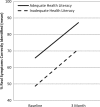Impact of targeted health promotion on cardiovascular knowledge among American Indians and Alaska Natives
- PMID: 23660462
- PMCID: PMC3716215
- DOI: 10.1093/her/cyt054
Impact of targeted health promotion on cardiovascular knowledge among American Indians and Alaska Natives
Abstract
The National Heart, Lung, and Blood Institute developed the Honoring the Gift of Heart Health (HGHH) curriculum to promote cardiovascular knowledge and heart-healthy lifestyles among American Indians and Alaska Natives (AI/ANs). Using data from a small randomized trial designed to reduce diabetes and cardiovascular disease (CVD) risk among overweight/obese AI/ANs, we evaluated the impact of an adapted HGHH curriculum on cardiovascular knowledge. We also assessed whether the curriculum was effective across levels of health literacy (defined as the 'capacity to obtain, process and understand basic health information and services needed to make appropriate health decisions'). We examined change in knowledge from baseline to 3 months for two groups: HGHH (N = 89) and control (N = 50). Compared with controls, HGHH participants showed significant improvement in heart attack knowledge and marginally significant improvement in stroke and general CVD knowledge. HGHH participants attending ≥1 class showed significantly greater improvement than controls on all three measures. Although HGHH participants with inadequate health literacy had worse heart attack and stroke knowledge at baseline and 3 months than did participants with adequate skills, the degree of improvement in knowledge did not differ by health literacy level. HGHH appears to improve cardiovascular knowledge among AI/ANs across health literacy levels.
Figures


Similar articles
-
Cardiovascular knowledge among urban American Indians and Alaska Natives: first steps in addressing cardiovascular health.Prog Community Health Partnersh. 2011 Fall;5(3):273-9. doi: 10.1353/cpr.2011.0042. Prog Community Health Partnersh. 2011. PMID: 22080775 Free PMC article.
-
Mechanisms underlying the relationship between health literacy and glycemic control in American Indians and Alaska Natives.Patient Educ Couns. 2012 Jul;88(1):61-8. doi: 10.1016/j.pec.2012.03.008. Epub 2012 Apr 11. Patient Educ Couns. 2012. PMID: 22497973
-
A community health promotion project: Amazing Race for Heart Health.Front Epidemiol. 2023 Dec 20;3:1278672. doi: 10.3389/fepid.2023.1278672. eCollection 2023. Front Epidemiol. 2023. PMID: 38455940 Free PMC article.
-
Community-responsive interventions to reduce cardiovascular risk in American Indians.J Prim Prev. 2012 Aug;33(4):153-9. doi: 10.1007/s10935-012-0277-9. J Prim Prev. 2012. PMID: 22983753 Review.
-
Advancing Diabetes Prevention and Control in American Indians and Alaska Natives.Annu Rev Public Health. 2022 Apr 5;43:461-475. doi: 10.1146/annurev-publhealth-093019-010011. Annu Rev Public Health. 2022. PMID: 35380066 Free PMC article. Review.
Cited by
-
Pathways Through Which Health Literacy Is Linked to Parental Oral Health Behavior in an American Indian Tribe.Ann Behav Med. 2021 Oct 27;55(11):1144-1155. doi: 10.1093/abm/kaab006. Ann Behav Med. 2021. PMID: 33830175 Free PMC article. Clinical Trial.
-
Effect of a health literacy intervention trial on knowledge about cardiovascular disease medications among Indigenous peoples in Australia, Canada and New Zealand.BMJ Open. 2018 Jan 24;8(1):e018569. doi: 10.1136/bmjopen-2017-018569. BMJ Open. 2018. PMID: 29371275 Free PMC article.
-
Methodological review: quality of randomized controlled trials in health literacy.BMC Health Serv Res. 2016 Jul 11;16:246. doi: 10.1186/s12913-016-1479-2. BMC Health Serv Res. 2016. PMID: 27402048 Free PMC article. Review.
-
Health Literacy and Parental Oral Health Knowledge, Beliefs, Behavior, and Status Among Parents of American Indian Newborns.J Racial Ethn Health Disparities. 2020 Aug;7(4):598-608. doi: 10.1007/s40615-019-00688-4. Epub 2020 May 8. J Racial Ethn Health Disparities. 2020. PMID: 32385848 Free PMC article.
-
Teach Our Children: Stroke Education for Indigenous Children, First Nations, Ontario, Canada, 2009-2012.Prev Chronic Dis. 2017 Aug 17;14:E68. doi: 10.5888/pcd14.160506. Prev Chronic Dis. 2017. PMID: 28817789 Free PMC article.
References
-
- Howard BV, Lee ET, Cowan LD, et al. Rising tide of cardiovascular disease in American Indians. The Strong Heart Study. Circulation. 1999;99:2389–95. - PubMed
-
- Howard BV, Lee ET, Cowan LD, et al. Coronary heart disease prevalence and its relation to risk factors in American Indians. The Strong Heart Study. Am J Epidemiol. 1995;142:254–68. - PubMed
-
- Rhoades DA, Rhoades ER, Welty TK. The rise of cardiovascular diseases. In: Rhoades ER, editor. American Indian Health: Innovations in Health Care, Promotion, and Policy. Baltimore: Johns Hopkins University Press; 2000. pp. 151–78.
-
- Sievers ML, Fisher JR. Diseases of North American Indians. In: Rothschild HR, editor. Biocultural Aspects of Disease. New York, NY: Academic Press; 1981. pp. 191–252.
-
- Nelson RG, Sievers ML, Knowler WC, et al. Low incidence of fatal coronary heart disease in Pima Indians despite high prevalence of non-insulin-dependent diabetes. Circulation. 1990;81:987–95. - PubMed
Publication types
MeSH terms
Grants and funding
LinkOut - more resources
Full Text Sources
Other Literature Sources
Medical

